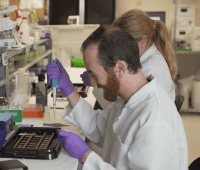 In biomedical research, antibodies play a crucial role in various applications, from Western blotting and immunohistochemistry to flow cytometry and ELISA. These powerful tools enable scientists to detect and quantify specific proteins within complex biological samples. However, with the growing concerns about the reproducibility crisis and the need for robust scientific results, it has become increasingly important to emphasize the significance of antibody validation. In this blog post, we will explore the importance of antibody validation and its impact on ensuring accurate scientific outcomes.
In biomedical research, antibodies play a crucial role in various applications, from Western blotting and immunohistochemistry to flow cytometry and ELISA. These powerful tools enable scientists to detect and quantify specific proteins within complex biological samples. However, with the growing concerns about the reproducibility crisis and the need for robust scientific results, it has become increasingly important to emphasize the significance of antibody validation. In this blog post, we will explore the importance of antibody validation and its impact on ensuring accurate scientific outcomes.
Antibody Validation
Antibody validation is assessing an antibody’s specificity, sensitivity, and reproducibility for a particular target protein. It involves rigorous testing to determine whether the antibody recognizes the intended protein accurately and consistently without cross-reacting with other molecules. Proper validation ensures the antibody is reliable, increasing confidence in experimental results.
Validating antibodies can be a complex task due to several challenges. One major challenge is the need for standardized validation protocols across different laboratories and research fields. Additionally, the quality and specificity of antibodies can vary even within the same product, further complicating the validation process.
Commonly Used Validation Approaches
To overcome these challenges, multiple methods can be employed to validate antibodies effectively. Here are some commonly used approaches:
- Western Blotting: Western blotting is widely used to assess antibody specificity. It involves separating proteins through gel electrophoresis and probing the membrane with the antibody of interest. By confirming the presence of a single band of the expected size, researchers can determine if the antibody recognizes the target protein specifically.
- Immunohistochemistry (IHC): IHC allows the visualization of protein expression within tissue samples. By staining tissue sections with the antibody and examining the localization pattern, researchers can verify if the antibody binds specifically to the desired protein in its native context.
- Knockdown or Knockout Validation: Genetic manipulation techniques, such as RNA interference (RNAi) or CRISPR/Cas9-mediated knockout, can silence or delete the target protein in cells or organisms. By confirming the signal loss when using the validated antibody, researchers can ensure the specificity of the antibody for the intended target.
- Peptide Blocking: Pre-incubating the antibody with a specific peptide corresponding to the epitope recognized by the antibody can be used to assess its specificity. If the signal is abolished or significantly reduced after blocking, it indicates that the antibody specifically recognizes the target protein.
Importance of Validated Antibodies
The consequences of using unvalidated or poorly validated antibodies can be severe, leading to misleading results, wasted resources, and incorrect conclusions. Researchers may unknowingly attribute nonspecific binding or off-target effects to their protein of interest, resulting in inaccurate data interpretation and potentially flawed scientific publications. Moreover, using such antibodies can hamper reproducibility, hindering scientific progress.
Recognizing the importance of antibody validation, scientific communities, funding agencies, and antibody manufacturers have started emphasizing the need for rigorous validation practices. Efforts are being made to establish guidelines and standardized protocols for antibody validation. Researchers are encouraged to share their validation data openly and include it in publications to improve transparency and facilitate reproducibility.
Antibody validation is crucial for generating accurate and reliable scientific results. By employing rigorous validation methods, researchers can ensure antibodies’ specificity, sensitivity, and reproducibility, minimizing false positives and negatives. Standardization of validation protocols and open sharing of validation data will strengthen scientific integrity and foster collaboration among the scientific community.
If you’re interested in working with Visikol, please reach out today!
